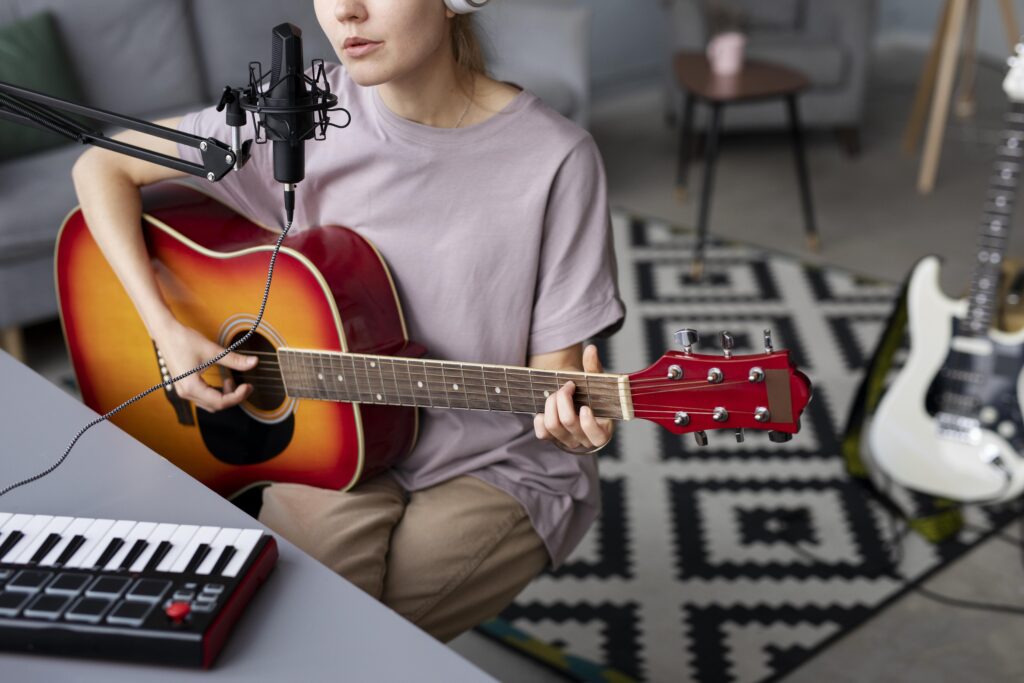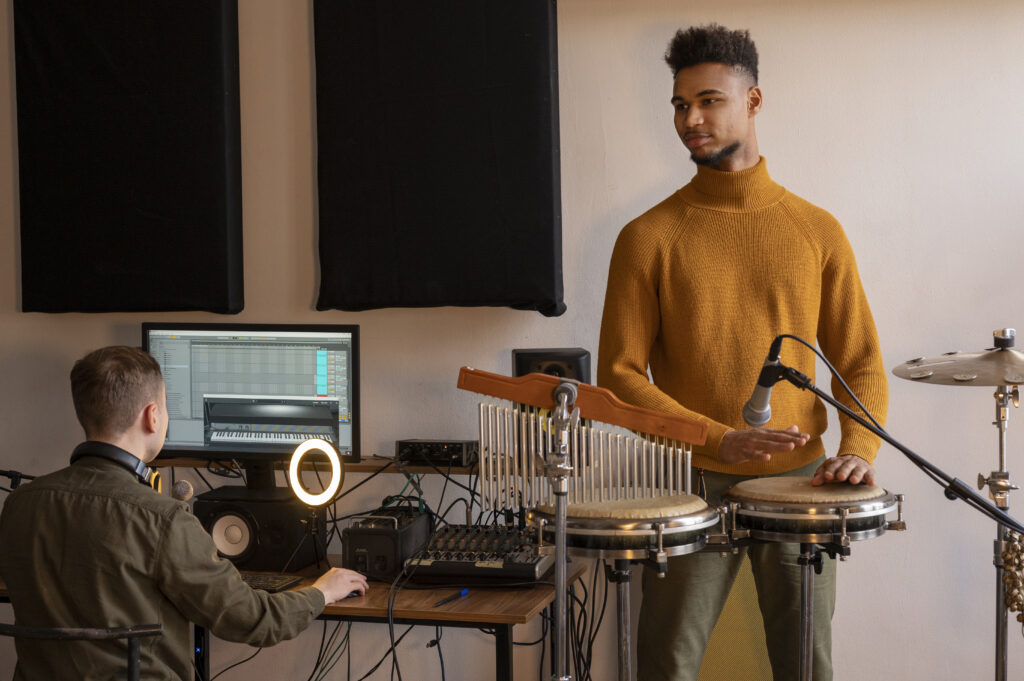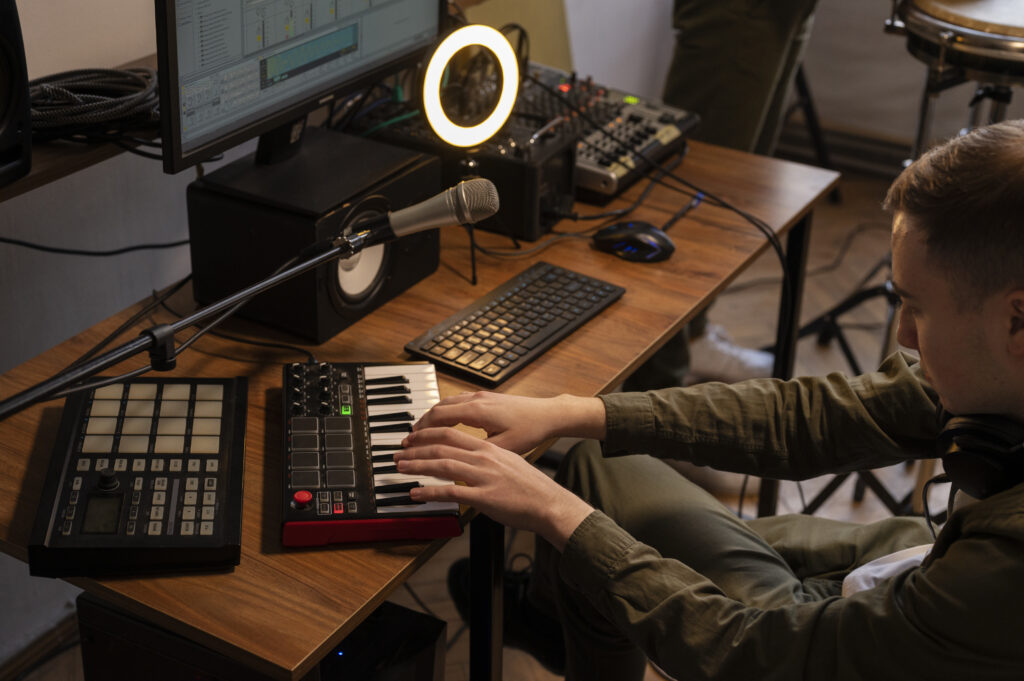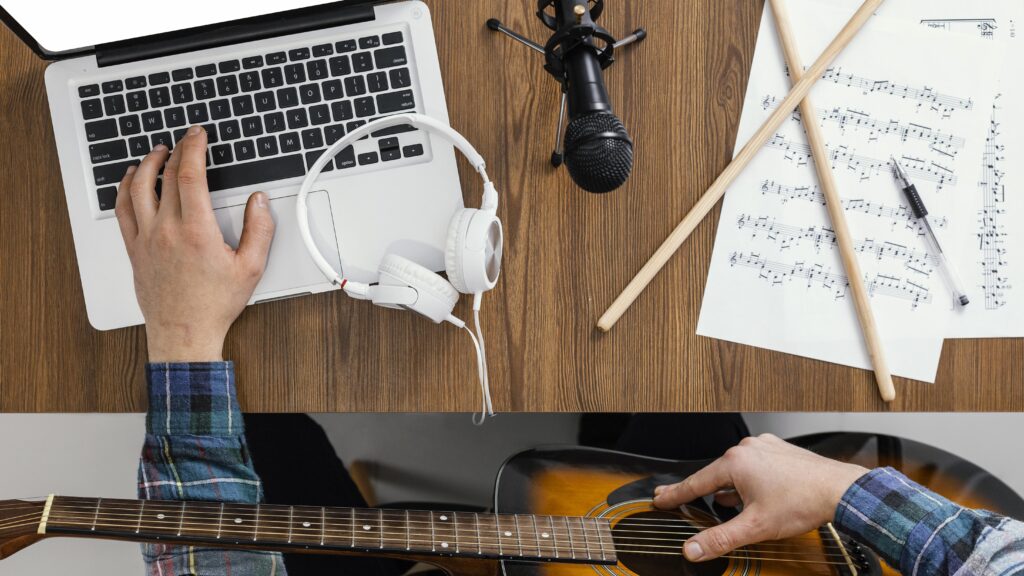Harmony or Discord: AI in Music Creation
As the digital revolution continues to transform industries, the music sector faces a particularly poignant inflection point with the incursion of artificial intelligence.
The integration of AI into music creation has given rise to a complex symphony of opinions, with proponents lauding its capacity to enhance composition and democratize production. At the same time, detractors warn of a dissonant future where the essence of human artistry is jeopardized.
AI’s pattern recognition and machine learning capabilities enable it to compose music that resonates with human emotions. Yet, whether these technological compositions can genuinely embody the nuanced soul of human experience remains a subject of intense debate.
Industry professionals and artists alike stand at the crossroads, contemplating the extent to which AI should be embraced without compromising the traditional values and creative integrity of musical expression.
Within this intricate interplay of innovation and tradition, the music industry must navigate, steering the course for a future that honors the legacy of the past while embracing the possibilities of the new.
Key Takeaways
- Integrating AI into the music industry is met with concerns about the integrity of streaming data and user engagement.
- There are ongoing deliberations about AI’s appropriate role in music creation, with the potential for AI to overshadow human creativity and perpetuate biases.
- Collaborative composition techniques bridge the gap between human creativity and technological innovation, enhancing human creativity while navigating copyright law and platform policies.
- Integrating AI in music raises complex ethical and artistic considerations, including questions about authenticity, ownership, and preventing unwanted content or manipulation.
The AI Composer Emerges

Amidst the evolving landscape of digital music, the emergence of the AI composer has sparked a complex dialogue surrounding copyright integrity and the future of musical creativity. The recent action by Spotify, which involved the removal of approximately 7% of Boomy’s AI-generated songs, underscores the burgeoning concerns within the music industry. This decision, prompted by Universal Music Group’s flagging of suspicious streaming activities, has highlighted the challenges of integrating AI-generated music within existing platforms and the potential for fraudulent streaming.
Curating a digital music platform is becoming increasingly intricate as AI-generated content proliferates. This raises questions about the potential for clutter and casts a shadow on the integrity of copyright law, as noted by the CEO of UMG. The validity and ownership of AI-composed music are subjects of intense scrutiny, as the technology blurs the lines between human creativity and algorithmic output.
In contrast, artists like Grimes advocate for adopting AI in music, suggesting that a framework of rules and fair royalty sharing could harmonize the relationship between AI and human artists. As AI continues to compose, the industry must navigate the delicate balance between innovation and the protection of artistic authenticity.
Machines and Melodies

The emergence of AI composers marks a pivotal evolution in the music industry, fostering a new dynamic between human creativity and algorithmic efficiency in crafting melodies.
As AI entities like Boomy generate vast music catalogs, the industry grapples with the implications for traditional copyright norms and the integrity of streaming metrics.
The ongoing discourse around AI’s role in music creation oscillates between embracing its potential to democratize music production and cautioning against the risks of diluting artistic authenticity.
AI Composers Emerge
As AI-generated compositions gain traction, the emergence of AI composers presents a paradigm shift in the realm of music creation, challenging traditional notions of artistry and authorship.
Spotify’s recent removal of approximately 7% of Boomy’s AI-generated songs signals a critical turning point. This decision, influenced by concerns over fraud and clutter, underscores the complexities of integrating AI into the music industry.
The contentious debate highlights a spectrum of perspectives, as some artists like Grimes advocate for AI’s role under structured regulations. In contrast, others question the authenticity and potential overshadowing of human creativity.
The industry faces a legal and ethical quandary, balancing the promise of innovation against the preservation of artistic integrity and copyright law, as AI composers herald an unpredictable future for music creation.
Human-AI Collaboration Dynamics
While AI-generated music raises questions of authenticity and creative ownership, the dynamic of human-AI collaboration offers a hybrid approach, blending machine precision with human emotion and artistry.
This collaboration dynamics can potentially harmonize AI’s algorithmic efficiency with artists’ nuanced creativity.
However, recent actions by Spotify and Universal Music Group underscore the complexity of integrating AI into the traditional music industry. The removal of AI-generated songs due to concerns about artificial streaming and copyright infringement reveals the friction within human-AI collaboration dynamics.
The music industry’s divided stance on AI’s role reflects a broader uncertainty, highlighting the need for careful navigation to foster innovation while preserving the essence of human musical expression and addressing the legal and ethical implications.
Artists Versus Algorithms

In the evolving landscape of music creation, tension mounts between traditional artists and the burgeoning influence of algorithm-driven compositions. Spotify’s removal of a significant fraction of Boomy’s AI-generated songs is pivotal in this unfolding drama. The purging, spurred by allegations of artificial streaming, underscores a critical concern: the integrity of human engagement in the digital music ecosystem.
Universal Music Group’s apprehension regarding the repercussions of generative AI on copyright law further accentuates the industry’s ambivalence.
On one hand, artists like Grimes acknowledge the transformative potential of AI in music creation, suggesting a horizon of untapped innovation. On the other hand, there is a palpable fear that algorithms’ mechanical precision and efficiency might overshadow the essence of human creativity. This dichotomy poses a profound question about the value we assign to human artistry in an age increasingly governed by technology.
The future of AI in music remains clouded with uncertainty. It is a frontier with the power to redefine the creative process, yet it is fraught with the risk of perpetuating biases and exacerbating inequalities. The debate is not merely about the coexistence of artists and algorithms but the preservation of human creativity as the soul of musical expression.
Ethical Notes in AI Music

Navigating the ethical landscape of AI-generated music requires carefully examining the complex interplay between innovation and protecting intellectual property rights. As AI continues to push the boundaries of musical creation, it becomes crucial to address the ethical notes in AI music, ensuring that the evolution of this technology harmonizes with the legal and moral frameworks established in the music industry.
The table below captures the essence of the ethical considerations that must be balanced:
| Ethical Concerns | Impact on Industry | Consideration for Resolution |
|---|---|---|
| Ownership & Copyright | Defining creators’ rights | Establishing clear guidelines for AI-generated content |
| Perpetuation of Biases | Reflecting or amplifying societal inequalities | Implementing unbiased algorithms and diverse training data |
| Democratization vs. Human Creativity | Balancing accessibility with artistic value | Encouraging symbiotic relationships between AI and artists |
In analyzing the ethical notes in AI music, it is evident that the sector requires a technical approach to ensure the democratization of music production does not overshadow the intrinsic value of human creativity. Addressing ethical implications calls for an insightful strategy that respects existing copyright laws while fostering new creative possibilities, ultimately achieving equity and preserving the emotional resonance that has long been a hallmark of human-composed music.
AI’s Impact on the Industry

Considering the ethical dimensions of AI-generated music, examining how these technologies are reshaping the music industry landscape is critical.
Spotify’s removal of 7% of Boomy’s AI-generated tracks is a pivotal case study, illustrating the platform’s evolving stance on such content. This decision, driven by fraud and clutter complaints, underscores a growing concern about the integrity of streaming data and the authenticity of user engagement.
The allegations of artificial streaming that led to the deletion of AI-generated songs reveal a more profound unease within the music industry. The ability of AI to influence streaming metrics and potentially distort market analytics raises questions about safeguarding digital platforms against manipulation. Furthermore, Universal Music Group’s concerns about the implications of generative AI on copyright law indicate a significant industry wariness, hinting at potential legal battles ahead.
While some stakeholders recognize the innovative prospects of AI in music creation, the division within the industry suggests an ongoing deliberation about AI’s appropriate role. The future trajectory of AI’s integration into the music industry remains fraught with complexities. The innovation potential and added value exist, but it is juxtaposed with apprehension over the diminishment of human creativity and the perpetuation of existing biases.
The Future Soundscape
Grasping the potential of AI to revolutionize the music industry, experts are now contemplating the nuanced soundscape of a future where artificial intelligence plays a pivotal role in music creation. The recent move by Spotify to remove a significant portion of Boomy’s AI-generated songs highlights the platform’s recalibration of how it manages the influx of AI-generated content. This decision, influenced by concerns of fraud and clutter and complaints from major industry players like Universal Music Group, underscores the complexities of integrating AI into the music ecosystem.
The future soundscape, as envisioned by some, could be a symphony of human and AI collaboration, enhancing creativity and pushing the boundaries of musical expression. Yet, this vision is clouded by substantial legal, ethical, and artistic concerns. The UMG CEO’s apprehension reflects a growing industry debate over copyright complications and the integrity of artistic creation.
Moreover, the potential for AI to overshadow human creativity, dilute authenticity, and perpetuate existing biases and inequalities cannot be overlooked. As the industry navigates these challenges, the future soundscape is set to be an evolving terrain of innovation and controversy, requiring careful consideration of AI’s role in music creation.
Bridging the Human-AI Gap
Integrating collaborative composition techniques between human artists and AI systems in music creation necessitates a nuanced understanding of AI’s role as a tool and a potential creative entity.
AI contributions in this domain should be examined by critically analyzing its ability to enhance or disrupt the artistic process.
Concurrently, the ethical implications arising from AI in music must be rigorously considered to ensure that the authenticity of human expression is preserved amidst technological innovation.
Collaborative Composition Techniques
While concerns about AI’s impact on the music industry persist, collaborative composition techniques leveraging AI are emerging to bridge the gap between human creativity and technological innovation. These techniques involve a symbiosis where AI algorithms generate musical ideas, which human composers refine and integrate into more significant works.
The recent removal of Boomy’s AI-generated tracks from Spotify highlights the platform’s caution in embracing AI’s role amidst issues like fraud and clutter. However, the incident underscores the importance of balancing AI contributions and human oversight.
As collaborative composition techniques evolve, they promise to enhance rather than replace human creativity, driving innovation in music creation while navigating the complex landscape of copyright law and streaming platform policies.
Understanding AI Contributions
To effectively harness the potential of AI in music creation, it is imperative to understand how it can complement and enhance human artistic expression. AI tools are instrumental in bridging the human-AI gap, supporting composition, arrangement, and mastering. Their use in AI-generated music helps amplify musicians’ creative capacity, fostering a symbiotic relationship that drives innovation and uncovers new musical talents.
This collaboration should strive for equilibrium, ensuring AI’s role is to underpin rather than overshadow the intrinsic human touch that resonates with emotional depth in music. Moreover, navigating ethical landscapes, addressing ownership, copyright intricacies, and inherent biases judiciously to maintain integrity within the AI-enhanced creative process is essential.
Ethical Artistic Considerations
Understanding AI’s contributions to music creation leads to an essential discussion on ethical artistic considerations, where technology integration raises complex questions about authenticity and ownership within the industry.
The removal of AI-generated music from platforms like Spotify has spotlighted these dilemmas:
- Ethical Artistic Considerations:
- Authenticity and Ownership:
- Does AI-created music dilute the value of human creativity?
- How do we address copyright when AI produces derivative or entirely original works?
- Industry Impact:
- How might artificial streaming from AI-generated content skew metrics and earnings?
- What safeguards are necessary to prevent AI from perpetuating unwanted content or manipulation?
This debate is pivotal as industry stakeholders weigh AI’s potential to enhance and unsettle the music creation landscape.
FAQs
What does the phrase “Harmony or Discord” suggest regarding AI’s role in music creation?
The phrase suggests a duality in the impact of AI on music creation, indicating that AI can either contribute to the harmony and coherence of musical compositions or introduce elements of discord and disruption to traditional music creation processes.
How does AI contribute to the harmony of music creation?
AI contributes to the harmony of music creation by offering tools and algorithms to assist musicians in composing, arranging, and producing music. It can analyze patterns, generate melodies, and provide creative suggestions, enhancing the overall harmony in the creative process.
In what ways can AI introduce discord in music creation?
AI can introduce discord in music creation by challenging traditional norms, experimenting with unconventional styles, or generating compositions that may diverge from established musical conventions. This disruption may be seen as both innovative and potentially discordant.
Can AI generate entire musical compositions independently?
Yes, AI can generate entire musical compositions independently. Advanced algorithms, including Generative AI models, can create melodies, harmonies, and even whole pieces based on patterns learned from extensive musical datasets.
How does AI impact the creative process of musicians?
AI impacts the creative process of musicians by providing new tools for inspiration, suggesting musical ideas, and offering alternatives in composition. It can streamline workflows and help musicians explore novel directions in their creative expression.
